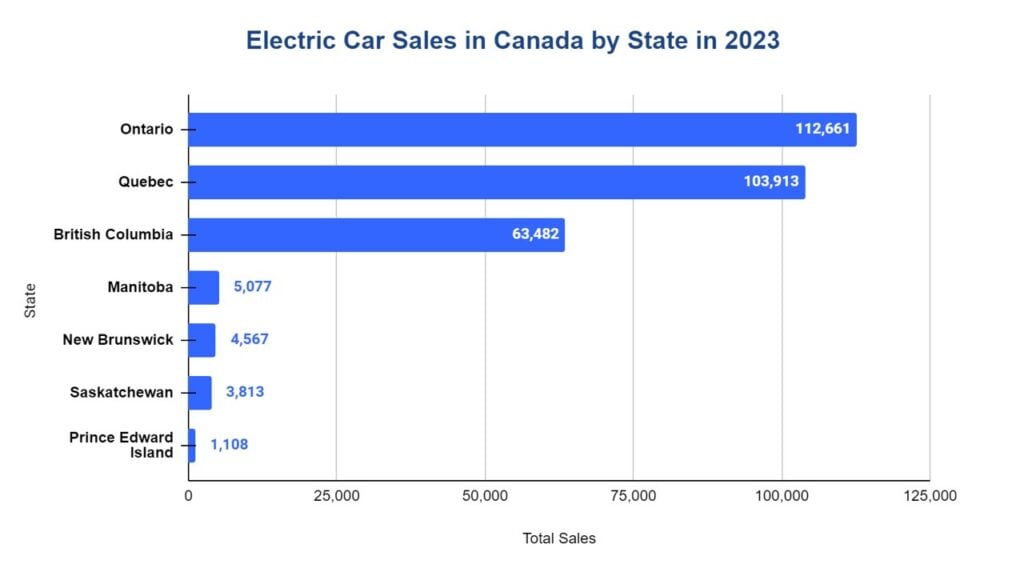Canadians' EV Interest Dips For Third Consecutive Year

Table of Contents
Rising Costs and Affordability Concerns
The increasing price of EVs in Canada presents a significant hurdle to widespread adoption. While gasoline-powered vehicles have also seen price increases, the already higher initial cost of EVs makes them inaccessible for many Canadians. Government incentives, while helpful, often don't fully offset the substantial price difference. The current inflationary climate further exacerbates this issue, reducing consumer purchasing power and making EVs a less attractive option compared to used gasoline cars.
- Average EV prices currently sit significantly higher than comparable gasoline-powered vehicles, often exceeding the budget of the average Canadian family.
- Government incentives, such as rebates and tax credits, vary across provinces and often don't cover a substantial enough portion of the purchase price to make a significant difference for many potential buyers. The complexity of accessing these incentives also adds to the challenge.
- Data from the Canadian Automobile Association (CAA) consistently shows a decrease in EV sales year over year, strongly correlating with increasing prices and economic uncertainty.
Range Anxiety and Charging Infrastructure Gaps
Range anxiety—the fear of running out of battery power before reaching a charging station—remains a major deterrent for potential EV buyers in Canada. This concern is particularly acute outside of major urban centers, where the density of charging stations is significantly lower. The uneven distribution of charging infrastructure across the country creates a significant barrier, especially for those who frequently travel long distances. Lack of access to fast-charging stations further limits the practicality of EVs for long journeys.
- Charging station density varies dramatically across Canadian provinces, with urban areas far outpacing rural regions. Statistics from Natural Resources Canada clearly demonstrate this disparity.
- Anecdotal evidence from Canadian EV owners reveals widespread concerns about range anxiety, particularly on road trips. Many recount stories of stressful journeys due to limited charging options.
- Compared to countries with more mature EV infrastructure, such as Norway or the Netherlands, Canada lags significantly behind in terms of both charging station density and network reliability.
Lack of Consumer Awareness and Education
Misinformation and a lack of understanding about EV technology, benefits, and maintenance contribute significantly to the declining Canadians' EV interest. Many potential buyers remain unaware of the long-term cost savings associated with EV ownership, including reduced fuel and maintenance costs. Effective public education campaigns are crucial to address these misconceptions and promote the advantages of EVs. Clear and easily accessible information on government incentives and total cost of ownership (TCO) is also critical.
- Surveys consistently reveal prevalent misconceptions among Canadians regarding EV charging times, battery lifespan, and overall running costs.
- Successful EV awareness campaigns in other countries, such as Norway's comprehensive public education program, demonstrate the effectiveness of targeted outreach initiatives.
- Improving public education in Canada requires a multi-pronged approach, including targeted advertising, interactive online resources, and community outreach programs.
Competition from Other Transportation Options
The increasing popularity of alternative transportation methods, such as public transit and cycling, in some Canadian cities, also impacts EV adoption rates. In areas with well-developed public transit systems, the need for a personal vehicle, even an EV, diminishes. Furthermore, the rise of hybrid vehicles presents a compromise for consumers hesitant to fully commit to an EV due to range anxiety or charging infrastructure concerns.
- Statistics on public transit usage in major Canadian cities reveal a growing trend towards alternative transportation choices.
- Sales figures for hybrid vehicles show a consistent market share, indicating consumer preference for a blend of gasoline and electric power.
- Investing in improved public transit and cycling infrastructure will reduce reliance on personal vehicles, regardless of whether they are gasoline or electric.
Conclusion: Rekindling Canadians' Interest in Electric Vehicles
The decline in Canadians' EV interest is a multifaceted problem stemming from rising costs, range anxiety, a lack of awareness, and competition from alternative transportation options. Addressing these challenges is crucial to accelerating EV adoption and achieving Canada's environmental goals. By implementing policies to reduce EV costs, expanding charging infrastructure, particularly in rural areas, improving public education, and fostering innovation in EV technology, Canada can reinvigorate Canadians' EV interest and pave the way for a sustainable transportation future. Take the initiative to learn more about electric vehicles and the available government incentives; consider the long-term environmental and financial benefits of EV ownership. Let's work together to reignite Canadians' EV interest and build a greener tomorrow.

Featured Posts
-
 Canada Vs Us Why Tourists Are Choosing The Great White North
Apr 27, 2025
Canada Vs Us Why Tourists Are Choosing The Great White North
Apr 27, 2025 -
 Ad Hoc Meldung Pne Ag Veroeffentlicht Gemaess Artikel 40 Absatz 1 Wp Hg
Apr 27, 2025
Ad Hoc Meldung Pne Ag Veroeffentlicht Gemaess Artikel 40 Absatz 1 Wp Hg
Apr 27, 2025 -
 Movies And Shows To Watch On Kanopy A Free Streaming Guide
Apr 27, 2025
Movies And Shows To Watch On Kanopy A Free Streaming Guide
Apr 27, 2025 -
 Exec Office365 Breach Crook Makes Millions Feds Say
Apr 27, 2025
Exec Office365 Breach Crook Makes Millions Feds Say
Apr 27, 2025 -
 Trumps Presence At Pope Benedicts Funeral Politics And Religion Intertwined
Apr 27, 2025
Trumps Presence At Pope Benedicts Funeral Politics And Religion Intertwined
Apr 27, 2025
